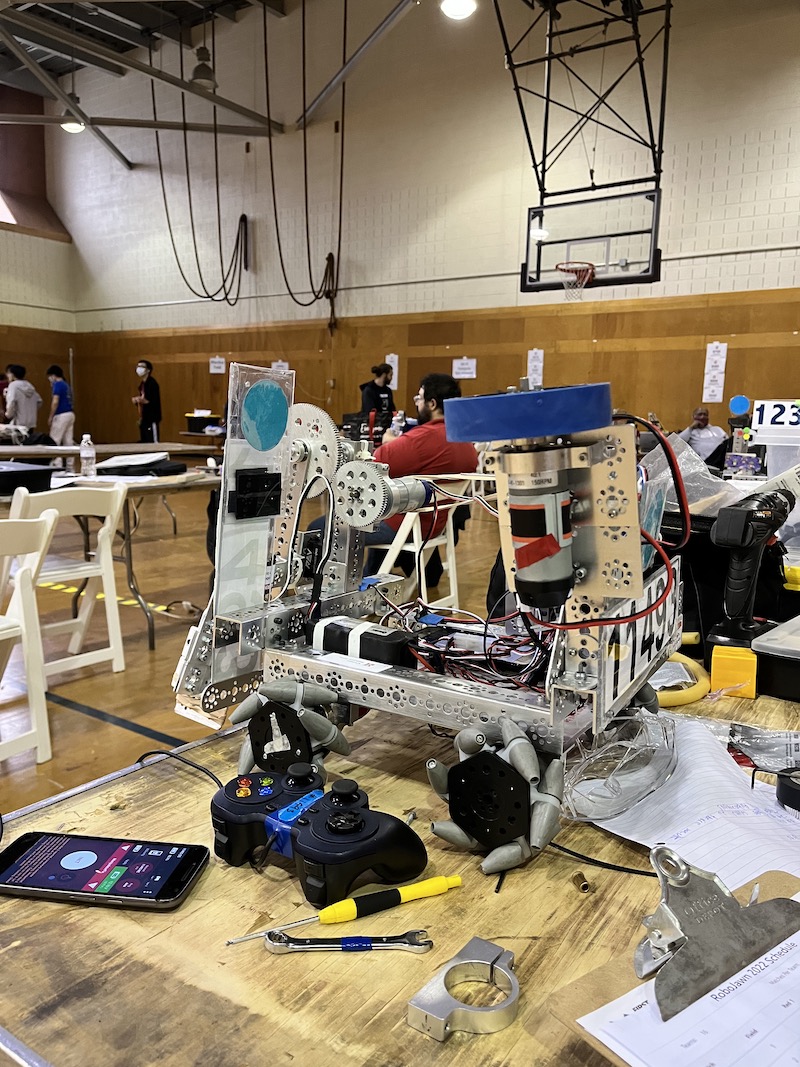Inside a basement gym Saturday morning, high schooler Lilyanna Sand was decorated in paint and rhinestones.
Laughing with friends, she was watching one of the four teenagers controlling robots they helped build, trying to beat their opponents in one challenge or another. Sand is a co-captain of one of four teams from prestigious Central High School. In that way, Sand is both exceptional, and representative. After decades of effort to boost science, tech and engineering talent, robotics programs remain an important early part of the journey.
“The students are the products, not the robots,” said Michael Johnson, a teacher at Central, which has one of Philadelphia’s most established robotics programs. Johnson meant no slight to his students, just an acknowledgment of how the students are the focus of the team, not the robots — despite the cheers these little machines can attract.
Robotics education on the rise
American employers urgently need engineering talent. Though much attention is paid to career changers and other existing professionals, many have long focused on increasing the number of students participating in early STEM programs. Across the country, robotics programs are growing, and they both serve as extracurricular activities for students and are increasingly seen as an on-ramp to careers in technology and engineering.

Those students, including Sand, were at Central as part of RoboJawn, a robotics tournament organized by the Philadelphia Robotics Coalition as part of the 12th annual Philly Tech Week presented by Comcast. The scene is increasingly familiar in Philadelphia and represents a significant trend.
Since it was founded in 1989, more than 2.5 million kids ages 4 to 18 from more than 100 countries have participated in programs associated with FIRST Robotics, one of the world’s largest and oldest such nonprofits, according to the org. The group says their students are almost twice as likely to end up in a STEM field. Locally, the Philadelphia Robotics Coalition has consolidated into the city’s preeminent organizer of various programs, clubs and efforts. Last year, the once all-volunteer effort hired its first executive director, Robin Walker, to spearhead future growth. Saturday is the continuation of that work.
The 19 teams in the Central basement gym were there for the title of Philadelphia Robotics Champion, but also represent a much larger picture.
STEM education for better representation
The tech industry has two related challenges: too few skilled professionals generally, and lagging progress in expanding those ranks with women and Black and brown technologists. Youth engagement in STEM skills is considered a necessary part of long term change, per PRC’s Walker. Women make up just a quarter of computer science-related jobs, and Black workers are just 9% of STEM roles, according to Pew Research.
The Central team co-captained by Sand, who lives in West Philadelphia, is part of that trend.
“Our team is mostly girls and our sister teams aren’t,” she said. “We’ve had to experience some of those effects. But we’ve been able to work together to learn how to confront those issues.”

In Philadelphia, the Coalition’s mission is to “build an ecosystem that supports the next generation of STEM and community leaders,” all while giving the teams the same amount of grant money to work from. As Walker put it, they allow schools with less funding or members to participate on a “level playing field” — while introducing young girls and people of color to the hands-on experience STEM has to offer.
Sand, who lives in West Philadelphia, is a co-captain of a mostly girls team as a freshman at Central. She’s interested in rocket engineering and possibly physics and knows her experience throughout this year is preparing her for the difficulties of the field. She wants to be an astronaut.
“It’s been really helpful as a woman in STEM to be able to work with a whole team of other girls,” Sand said. “Just learning how to do it.”







